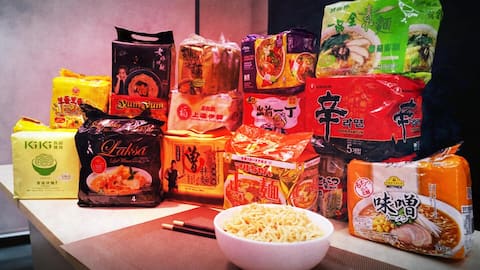Instant noodles contain cancer-causing chemicals, reveals study
What's the story
Hong Kong's consumer watchdog has reported that nearly 90% of instant noodles tested contain potential carcinogenic contaminants. According to a recent study, the Consumer Council disclosed that they found potential cancer-causing chemicals, namely 3-MCPD and glycidol, in 17 out of 19 samples of pre-packaged fried and non-fried instant noodles. The council has urged the industry to prioritize public health by reducing such harmful substances.
Limit exceeding
Excessive palm oil
Among the tested instant noodles, three varieties—Kung Tak Lam Vegetarian Noodle (Mushroom), Meadows Tom Yum Flavour Instant Noodles, and Mamee Pepper Noodles—were identified with seasoning packets containing palm oil. These samples exceeded the limits set by European Union EU of respective vegetable oils. Specifically, the first two noodles contained 3,100 µg/kg of 3-MCPD, while the third had 5,111 µg/kg of glycidol.
Harmful ingredients
3-MCPD is a 'possible human carcinogen'
The International Agency for Research on Cancer has classified 3-MCPD as a "possible human carcinogen," while glycidol is categorized as a genotoxic carcinogen. EU regulations for palm oil specify a maximum limit of 2,500 micrograms/kg for the total 3-MCPD and its fatty acid esters. Additionally, the maximum allowable level of glycidol in general edible vegetable oil is set at 1,000 micrograms/kg.
High sodium found
High amounts of sodium were also found
The sodium content in the tested samples varied between 1,509 milligrams and 2,477 milligrams. All samples surpassed the recommended adult intake limit set by the World Health Organization (WHO) at 667 milligrams per meal for adults consuming one full serving (noodles with sauce). The WHO suggests that adults should aim to consume less than 2,000 milligrams of sodium per day.
Non-fried noodles
Exceeding the WHO limit
The watchdog noted that so claimed healthy non-fried noodle varieties were not an exception as all samples were found to have high sodium levels. According to the watchdog, the sodium intake from nine of these samples surpassed the recommended daily intake limit for adults. Additionally, the highest sample contained 2,477 milligrams of sodium, which was almost 23.9 percent higher than the WHO's recommendation.
High fat
Even fats were present beyond measures
Among the nine samples, a single serving of non-fried prima taste's premium noodle surpassed the recommended adult intake limits for both total fat and saturated fat. With 34.1 grams of total fat and 22.4 grams of saturated fat, from its seasonings and toppings, it exceeded the WHO's suggested maximum intake per meal of 22.2 grams of total fat and 7.4 grams of saturated fat.
Other retailer
Watchdog warns of cardiovascular health hazards
The producers of Prime Taste's noodles emphasized that the levels of 3-MCPD and glycidol detected in their product fell below the upper limit specified by the EU standard, affirming its safety for consumption. The watchdog cautioned against elevated saturated fat and sodium intake as excessive consumption of both could also pose significant cardiovascular health hazards.
Urge to reduce
The council is urging the industry to increase control
Neither Hong Kong nor the EU have established maximum limits for the detected levels of 3-MCPD and glycidol in instant noodles and their seasonings. Although scientific research has not established a direct link between consuming instant noodles and increased cancer risk, the council is urging the industry to increase control over the quality of raw materials and production processes.
Retailers explain
The products have been withdrawn from shelves
The distributor of Meadows noodles stated that while the questioned products complied with city regulations, they had been withdrawn from shelves. They are also committed to enhancing the quality of their future products. The manufacturer of Mamee affirmed that the detected levels of 3-MCPD and glycidol in their product met the standards outlined in the Harmful Substances in Food Regulations of WHO
